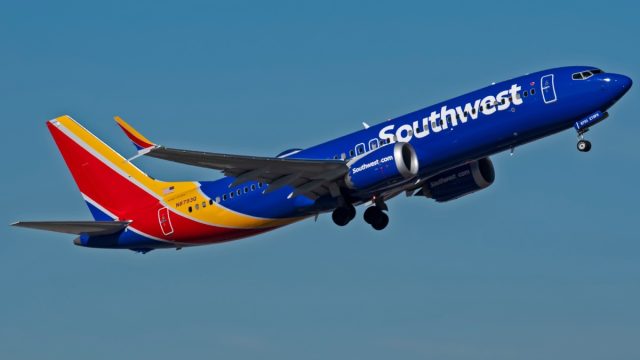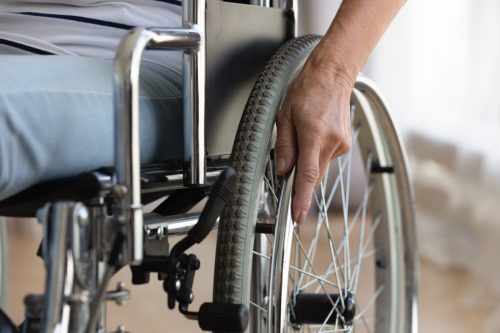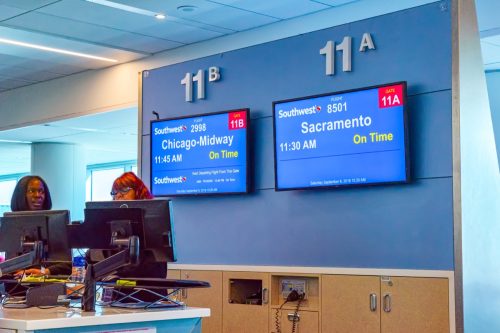Southwest Airlines Slammed for Controversial “Pre-Boarding Scam”

By far one of the most stressful parts of flying—aside from getting through the TSA line, of course—is the boarding process. Every airline has its own procedure, but there’s always an underlying feeling of stress when it comes to who’s getting on first, and whether you’ll be able to fit your carry-on in an overhead compartment. Southwest Airlines has one of the most famous (or infamous) boarding policies, which doesn’t include pre-assigned seating. And now, one passenger is calling attention to the wheelchair policy on Southwest, which he called a “pre-boarding scam.” Read on to find out more about the latest airline backlash.
READ THIS NEXT: Southwest Is Finally Changing the Way It Boards Flights.
A Southwest passenger claims people are playing the system.

On June 24, a Southwest passenger took to Twitter to allege that his fellow travelers are abusing the airline’s wheelchair policy in order to board ahead of others.
“Pre-boarding scam @SouthwestAir 20 passengers boarding using a wheelchair and probably only 3 need one to deplane,” Paul, who uses the handle @trendready, wrote.
According to Southwest’s policy, passengers who need wheelchair assistance have to identify themselves when getting to the airport, at connection points, and when getting to their destination. Those traveling with their own wheelchair have the opportunity to add it when booking their flights.
Southwest responded by defending its pre-boarding process.

Southwest responded on Twitter that same day, writing, “We’re sorry for any disappointment, Paul. We work hard to maintain the integrity of the boarding process while providing appropriate accommodations for all who fly. Since many disabilities aren’t visible, we’re unable to question the validity of preboarding requests.”
The airline continued, “We appreciate your feedback and hope to create more pleasant memories next time.”
Best Life reached out to Southwest for comment on the situation, but has not yet heard back.
RELATED: For more up-to-date information, sign up for our daily newsletter.
He continued tweeting the next day.

The saga carried into the following day when Paul posted additional photos. While group C is typically the third and final group to board on Southwest flights, he alleged that a family found a way around that designation.
“@SouthwestAir The wheelchair scam continues this morning. How do a family of ‘C’ boarding Pre-board? Get grandma to sit in a wheelchair. Now the whole family (5) gets to accompany her,” he wrote on June 25.
In another tweet, Paul claimed the “grandma” in question then stood up to walk to the plane.
He also alleged that 14 people were in wheelchairs when boarding, but only six were in them when getting off. “56% scammers,” he wrote.
Southwest again replied to reiterate that their policy adheres to the Air Carrier Access Act (ACAA), which “prohibits discrimination on the basis of disability in air travel.”
“Hey, Paul! Our preboarding policy is in compliance with ACAA requirements and allows us to provide appropriate accommodations for all who fly with us,” the airline tweeted on June 25. “Nevertheless, we regret if you were disappointed with your experience, and we appreciate you sharing your perspective.”
The controversy sparked a larger discussion online.

The tweets prompted plenty of discourse on Twitter, with some siding with Paul, claiming they’ve witnessed the same “scam” and that they don’t even fly with Southwest anymore as a result. Others suggested that travelers should be required to “provide proof of disability,” similar to laws surrounding handicapped parking.
However, some respondents backed Southwest, and urged others not to judge their fellow passengers just by what they see.
“My husband uses a wheelchair – he may look fine to everyone else waiting to get on the plane but he can’t stand for very long,” one Twitter user wrote in response to Paul’s tweet. “He could get up and walk to the bathroom and getting off, no one is there to help with the wheelchair – don’t assume!”
For his part, Paul suggested that Southwest require anyone who boards with a wheelchair to wait for all passengers to deplane before getting off themselves. “That would stop the scam,” he wrote, further recommending the airline review data to determine how many wheelchairs they’ll need at any given destination.
However, he also noted, “In no way do I want to hinder anyone who legitimately needs help. Any solution that doesn’t burden them is worth trying.”